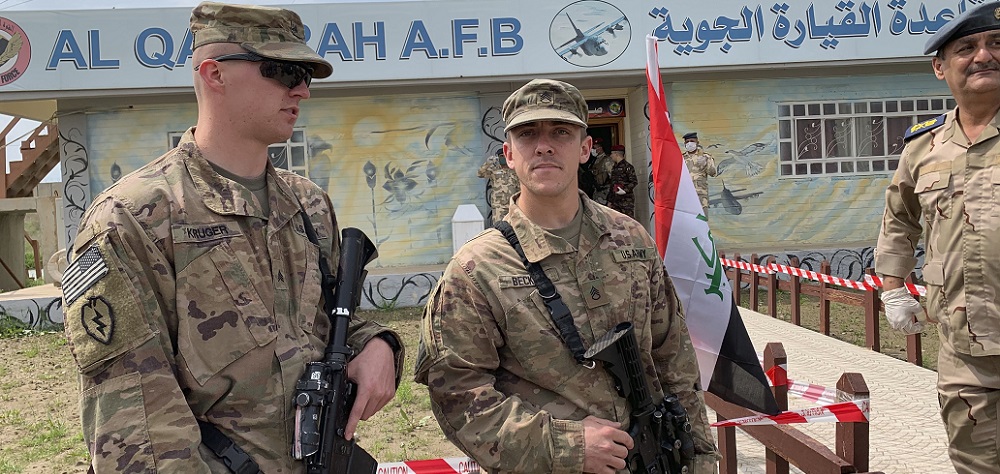Alwaght- Over the past few days, the international and regional media unprecedentedly reported that the US plans attacks on Iraq’s Public Mobilization Forces (PMF), a voluntary force constitutionally part of the Iraqi Armed Forces.
The reports have been so intense over the past week that even the Iraqi officials including the caretaker Prime Minister Adel Abdul Mahdi warned of any attacks on the Iraqi forces and the PMF leaders asserted that they are at the highest level of readiness to respond to the “occupying forces” in case of any new hostility.
Evacuating Iraq military bases aimed at waging psychological warfare against resistance forces
The reports about potential comprehensive attacks by the American forces on the Iraqi voluntary forces is more psychological warfare than a real plan to strike the anti-occupation forces.
Over the past months, Iraqi forces opposing the American military presence in their country launched several mortar and rocket attacks on the American embassy in the Baghdad’s Green Zone and also bases hosting the American troops. The Americans might have not taken the Iraqi threats seriously but now they are coming up with the notion that not only they cannot stay but also military presence can increase their susceptibility.
The immediate option for the Americans to steer clear of being targeted by the resistant forces’ rockets is limiting the number of their military bases in Iraq. Evidence shows that the Americans are leaving the Taji base in northern Baghdad, Basmaya in southern Baghdad, Al-Ghayara in Mosul, and even Al-Qaem in Al-Anbar province. Further evidence shows that thousands of US-led Western coalition troops, as well as military equipment and weapons worth of millions of dollars, are being transferred to Ein Al-Asad base in Al-Anbar and Harir in Erbil, the capital of the Kurdish autonomous region in northern Iraq.
Reports suggest that the US has recently deployed Patriot air defenses and Counter-Rocket, Artillery, and Mortar (C-RAM) systems in Al-Asad and Harir bases. The fascinating point is that along with the defensive measures which apparently indicate the American regional policy defeat, the US has arranged wide-range media propaganda about its plans for heavy-handed attacks on the PMF, locally called Hash al-Shabbi. The field realities demonstrate that the American measures are more to cover up their setbacks and retreats in the face of the Iran-led Axis of Resistance than to represent a real plan to counter the Resistance camp in Iraq. If the US had a real intention to launch the attacks, it would have carried out them suddenly, instead of trumpeting on its media.
Trump seeks to keep the situation calm for presidential elections
A good question to ask is that what Washington seeks behind this propagandistic campaign. The best answer can be that Trump’s security team is arranging to save the president from the ongoing crisis. While Trump thought that everything was prepared for his victory in November 3 election, he was struck by an uncalled-for guest: The coronavirus, turning the equations on their head, to his frustration. Now the economy as the strong and winning point of Trump is stumbling and if things get worse, the country will witness a big crisis.
In the middle of this situation, the Trump foreign policy team does not want to see a predicament caused by the killing of US troops in confrontations with the Resistance camp. Trump advisors predict that as the presidential election moves closer, the attacks on the US troops in Iraq will be stepped up. Fatalities among the American forces will prompt a crisis for Trump that can be seized by the Democratic Party to question the president’s foreign policy.
White House futile game
When on January 5 the Iraqi parliament approved the foreign forces expulsion bill, the alarm bells were set off for the US. The American leaders figure out very well that unlike in the past there is a sturdy will by the Iraqis to expel them from Iraq. Even if the PM fails to force the US out, the American troops should anticipate difficult days.
Even if now the US strikes the PMF and kills a number of their fighters, this will never guarantee the US win. Not only anti-Hashd strikes will not bring any success to the White House but also the Arab country will turn into another Vietnam for the American troops and the Washington-Baghdad ties will deteriorate unprecedentedly.
The reality is that any US raids will be met with overwhelming responses from the PMF with huge fatalities among the Americans. Trump officials talk about destroying a force that is not like an official army, rather it has its deep roots in firm beliefs of the Iraqis. It has not been and will not be obliterated by any attack.
US diplomatic impasse in Iraq
A focus on the Washington policymaking especially under Trump toward political and military relations with Iraq and also Baghdad’s relations to the Axis of Resistance reveals Washington’s diplomatic impasse to manage the developments in this central point of the US regional policy over the past two decades.
In fact, now the US is highly concerned over the security of its advisors and military service people and uses economic and military threats to secure them while it thought that after the invasion in 2003 Iraq will be its ally in the region. But not only this alliance does not exist now but also the US acts hostilely like an occupying force in Iraq, revealing its strategic and diplomatic dead end in Iraq.



























